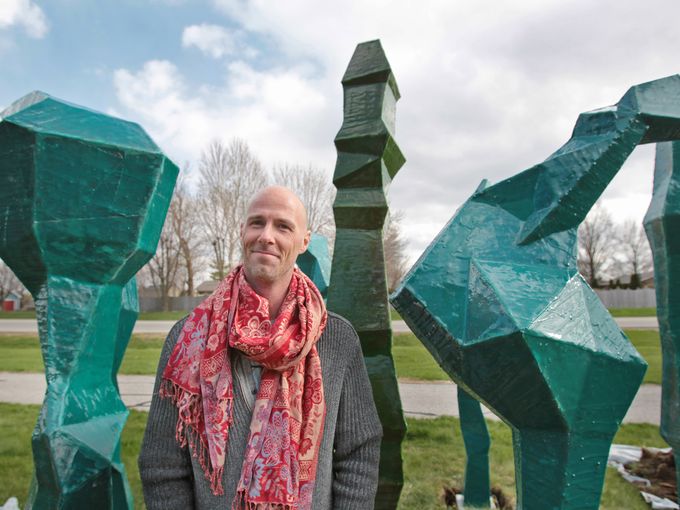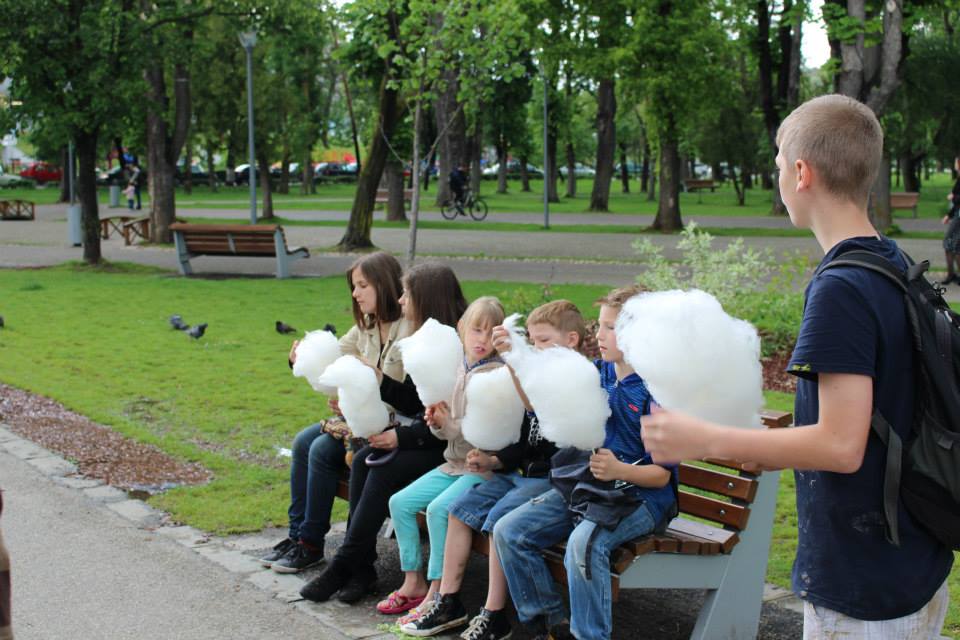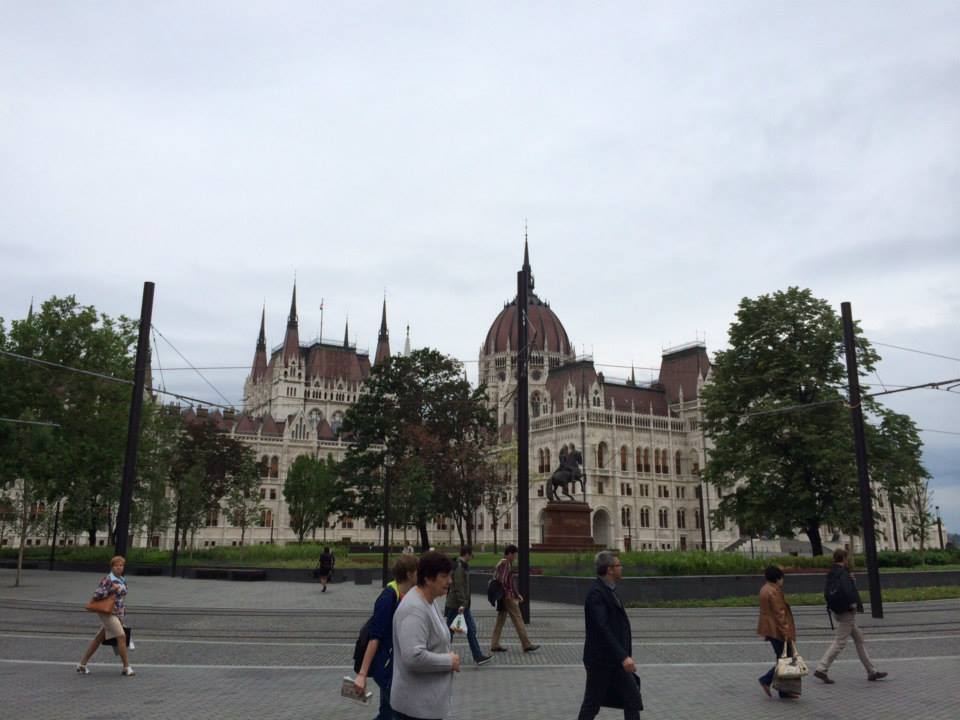Gold Leaf, Brush Strokes, and White Cotton Candy: Quincy Owens’ Pursuit of Happiness
“Happiness is when what you think, what you say, and what you do are in harmony.”
- Mahatma Gandhi
“I am thankful that I get to do what I do because I truly love doing it,” Quincy Owens explained on the cusp of his latest show’s opening.
Heavy laden with time, thought, and depth, Quincy Owens’ latest body of work entitled “The Pursuit of Happiness (Everything Will be Gold)” gracefully fills Gallery No. 2 this month. This show was sparked by a trip he took to Eastern Europe this past summer as part of his Cultural Renewal Fellowship, with the helpful generosity of the Efroymson Family Fund in partnership with the My City, My World program. While there, Owens was struck by the depth and paradoxical nature of honor that is foundational to Romanian and Hungarian culture.
“The main point of the show is based on the culture of the people we visited on our trip. In Eastern Europe there was a beautiful abundance of paradox with which our Western culture generally struggles,” he continued, “I loved thinking more about history in general, and specifically the history of the growth of a culture.” This abundant paradox Owens spoke of is sourced in three specific holidays he saw celebrated.
“I’m interested in comparing the specific worldview of the people we were there with to the general Western societal worldview. What I enjoyed about that society was the way they embraced who they are, specifically within the Hungarian culture.” He explained, “This specific culture actually has three national holidays celebrating lost battles. That cultural personality trait bleeds very thickly through their ethnicity in general, and I like that idea of not only accepting failures and imperfections, but also embracing them. I thought about what they honor.”
Owens went on to explain that because his work is abstract in nature, he noticed that these people have a long lasting love for family. “In fact,” he said, “it’s not unusual for families to live together throughout their entire lives. This creates an incredible generational richness and stands in stark contrast to the way our society sends out our youth to achieve and work and work and work only to have them realize later in life that they failed to honor their families, or even spend time with them for that matter.”
What Owens saw in Eastern Europe was made manifest in his work through the realization that honor and achievement are not the same thing. We produce, ground, and carry honor with us as humans. Achievement is, in a sense, coincidental.
Having completed the preliminary for his show prior to his European excursion, Owens returned to the States culturally enlightened, waited a bit to process his trip as he completed some other projects, and then got to work. “I completed all the work for this show in 11 days. The week prior to the show opening I worked for over 100 hours. I stayed up till at least 2:00 in the morning every day working in the studio, and here’s the thing. I loved every minute of it,” Owens said, “Find me the percentage of people who did something similar to that in a week’s time, and loved every minute. I am so grateful that I get to do what I do because I truly love doing it.”
With his European experience still fresh on his mind, Owens took what he had learned about familial honor with him to his parents’ house on Thanksgiving. “My parents have 10 acres south of Indianapolis so that land is where the wood sculptures in the show came from. That land is where I played and grew up, and the wood for the sculptures came from the same forest where I climbed trees as a kid. For me the sculptures are probably the most important part of the show because, as an artist, I’ve always struggled with figuring out the best way to honor my dad in a way that is honest for me, and in a way that he would truly understand,” he explained, “So I came up with the idea of asking him if he would help me cut the wood. We worked all morning on Thanksgiving until it was time to eat, and after we finished eating, I put my shoes back on to go out and keep working. Naturally my dad felt obligated to help me. It was beautiful because he didn’t have to. He just wanted to spend time with his son.”
As they continued to work, the blades on the chainsaws eventually became too dull to continue. At this point, Owens’ father took him to get the blades sharpened. The family friend who was sharpening the blades asked the two why they weren’t back at home relaxing on the couch to which Owens’ father replied, “Well this one’s been working all day!” Owens’ looked at his father and simply said, “I haven’t been working. I’ve been playing.” This comment left his father with a huge smile on his face.
“What was so beautiful about this whole experience,” Owens explained, “was that this same wood we were cutting was the same wood my dad had cut to keep us warm as kids, and it was the same wood that he had sold for extra money to keep us fed. To be able to take what he had called ‘work’ when I was a child, and to turn it into what I call ‘work’ as an adult to provide for my children was incredible. I went back out that Sunday to finish up, and by this point my dad had watched me sculpt enough that he started sculpting, too. It was wild to see my dad turn into an artist right before my eyes…”
“I’ll never forget those two days,” Owens said, “By doing what I love, I got to enjoy this time with my dad and honor him at the same time.”
Quincy Owens’ show “The Pursuit of Happiness (Everything will be Gold)” hangs this month in Gallery No. 2. This show features abstract works and sculpture work inspired by the cultural richness of the Romanian and Hungarian cultures uniquely paired with Owens’ own experience and family back home. His work reminds us that to fail is not to lose one’s honor, but it is an opportunity to celebrate and even embrace the formative power of this failure. In a sense, Owens pushes his audience to accept the idea that, to fail is to grow. Also featured in this show, in partnership with My City, My World are photos portraying well the time Owens spent in Eastern Europe in an effort to build global relationships through broader understanding.
Take some time with the work of Quincy Owens. Let it challenge your Western worldview. Let it help you grow.








